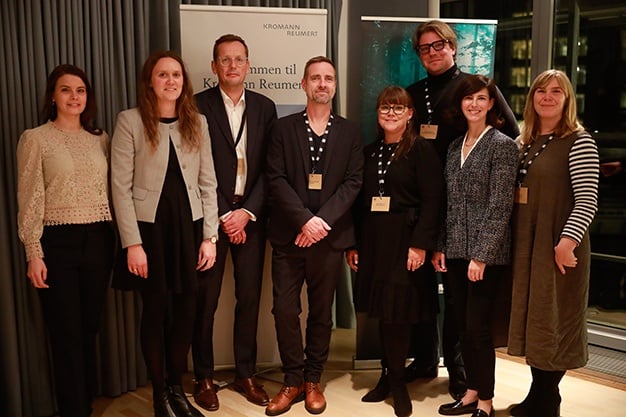Event Report
Our third event connected to the Legal 500’s Global Green Guide took place in Copenhagen, Denmark. The two panel discussions saw participation from a combination of leading professionals from the legal sector and academia and in-house sustainability experts on sustainability and climate action from a legal perspective.
The first panel focused on accelerating a green transition through corporate sustainability, due diligence, and cooperation, and the second highlighted the challenges of colour-washing in corporate governance.
Olivia Hart, senior researcher for the Legal 500 Global Green Guide, delivered the welcome address and opening marks. Maria Holst Levin, a partner at Kromman Reumert, introduced the panels and moderated the first panel. She considered the existing and potential drivers of a green transition and challenges.
Thomas Hinrichsen, partner and general counsel for Copenhagen Infrastructure partners, gave an overview of the critical role of consumers in driving a green transition for businesses, a view supported by Robert Kirstejn Schmidt, who heads up sustainability at Nuuday. Robert also weighed up the weaknesses of relying on customer preferences, using the example of mobile phones. He encouraged a push in the private sector to drive the demand for greener IT products.
Susan Korsholm Høj, legal counsel for CataCap Management, explained the risks associated with private equity of not acting responsibly or thinking ahead for an exit strategy. She also highlighted the challenges of navigating the “tsunami” of new sustainable financial regulations. Lone Wandal Mouyal, associate professor, Ph.D at the University of Copenhagen, echoed these concerns, stating that a particular challenge is the need to continuously create and rebuild trust in financial products and services.
On increasing reporting requirements, Robert emphasised that this would be especially demanding for small and medium-sized companies that operate without large compliance departments’ support. As a possible solution to this issue, Robert spoke of common audits whereby companies collaborate and share supply chain audits. Susan raised a concern that this approach puts compliance on companies far beyond their range of influence and assumes a significant sphere of influence that SME companies do not have. Lone stressed the importance of the preventative role of lawyers coming in at an earlier stage to advise.
The Q+A section of the panel included a discussion on the ability to prioritise sustainable activity for businesses in the context of significant events such as the Russian invasion of Ukraine and the readiness of non-Nordic EU states for the CSDD. To round up the first discussion, Thomas drew attention to technology as one of the key challenges in the green transition, the need for opening investments with EU support, and emphasised the market for companies to understand business opportunities associated with ESG. Robert called for tougher legislation, whilst Susan stated the need for common standards. Lone identified the governance gaps in engaging younger employees with ESG.
Sofie Jenson, Director/Attorney at Kromman Reumert, moderated the second panel and heard perspectives from four experts on colour-washing and corporate governance challenges.
Trine Pondal, head of sustainability at Flying Tiger Copenhagen, immediately stressed the need for a data-driven approach to being ready for regulations and the importance of always thinking ahead, especially as all Flying Tiger products are purchased one year in advance.
Marissa Saretsky, VP of global sustainability at Pandora, stated that companies should educate the entire organisation on the new regulations and create task forces and working groups accordingly.
Kristjan Jespersen, Associate Professor, Ph.D at Copenhagen Business School, emphasised biodiversity, which he considers a frequently ignored aspect of sustainability and predicts will become something that will also blow up in terms of compliance.
When asked about mitigating colour washing risk, Marissa focused the conversation on the specific difficulties presented when it comes to marketing, particularly ensuring local marketing teams are on the same page. At Pandora, they have implemented a pragmatic process of embedding checkpoints into the end-to-end process with regard to sustainability and consulting legal experts. Maria Holt Levin, a partner from Kromman Reumert, also joined the second panel and emphasised the importance of an educated board in mitigating this risk.
Kristjan drew attention to the importance of centralised data and having experts within the company who understand how this data is collected. Maria responded by stating that, although data is important in the Danish business environment, many SME businesses would not have access to these resources.
The conversation then moved to consider what level organisations should be aspiring to. Marissa considered the role of regulation as a support rather than what companies should be aspiring to, as we need to look beyond current regulations. Trine agreed with this sentiment and recognised the need to align with future climate agreements following the Paris Agreement.
Kristjan reflected on the need for businesses to understand what commitment makes the most sense within their specific industries, commitments that demand boards to ‘compress their universe,’ i.e., understanding that it may not be realistic to seek to achieve net zero for a company in the financial sector due to the immense scope of investment.
The Q+A session raised some exciting debates surrounding incentives to encourage more sustainable practices for typically heavily polluting industries in Denmark. The panel ended with each panellist stating what they consider the most important initiative for ESG. The group concluded that these were: aligning with experts; cross-functional dialogue; honesty and board resilience; and educating the whole organisation.
The evening concluded with a reception, giving participants and speakers a chance to mingle, network and continue the conversation.

